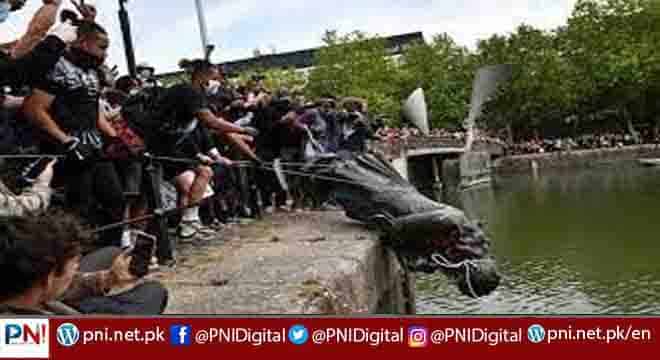London, Dec 13 (AFP/APP):Four people went on trial in Britain on Monday in connection with the toppling of a statue of a 17th century slave trader during anti-racism protests.
Demonstrators pulled down the bronze memorial to Edward Colston in Bristol, western England, on June 7 last year, then dragged it to the city’s harbour and threw it in the River Avon.
The actions came as part of global Black Lives Matter protests prompted by the killing by a white police officer of George Floyd, an unarmed black man, in the United States the previous month.
Four people were arrested following the toppling of the statue of Colston, a leading figure in the Royal Africa Company which forcibly moved large numbers of West Africans.
The defendants — Rhian Graham, 30, Milo Ponsford, 26, Jake Skuse, 33, and Sage Willoughby, 22 — have pleaded not guilty to criminal damage to the listed monument.
Opening the prosecution case, lawyer William Hughes alleged that the defendants exchanged chat messages confirming their involvement in pulling down the statue.
While acknowledging that Colston was a “divisive” figure, Hughes told the jury his historical role was “wholly irrelevant” to the trial.
The defendants, who were cheered into court by supporters, helped to pull down the statue, roll it down to the harbour and push it into the water as part of a “criminal enterprise”, he told the court.
The jury watched video footage allegedly showing Willoughby, Graham and Ponsford approach the statue and Willoughby climb on top of it.
After that, ropes were slung around the statue and some dozen people pulled it down, after which some jumped and spat on the toppled figure.
Jurors were told that an estimated £3,750 ($4,960, 4,390 euros) of damage was caused to the statue, and a further £350 of damage to the railings on the bridge.
Hughes said Willoughby told police that he put ropes on the statue but that he did not pull it down or put it in the harbour.
Graham told officers she was in the footage and that the statue had caused “massive offence” to the people of Bristol.
Skuse and Ponsford made “no comment” to police, Hughes added.
– Banksy backing –
To support those on trial, which is due to end before Christmas, the artist Banksy, who comes from Bristol, has been selling T-shirts to mark the occasion for £25.
“All proceeds to the defendants so they can go for a pint,” the elusive graffiti artist wrote on his Instagram page.
The limited edition grey souvenir tops have a picture of Colston’s empty plinth with a rope hanging off, debris and a discarded sign, as well as the word “BRISTOL” written above.
The Black Lives Matter protests have forced Britain into a reckoning with its colonial past, prompting a reassessment of statues, road names and buildings linked to historical figures associated with slavery.
Several Bristol institutions bearing Colston’s name have since changed their name to avoid negative associations with him and the slave trade.
The statue, which had stood in the city since 1895, was recovered from the Avon and put on display in a local museum, with placards from the event along with explanations of what happened and why.
The empty plinth was temporarily replaced by a statue of a female protester from the day, but that was taken down within 24 hours as it did not have local authority permission.
British Prime Minister Boris Johnson’s government is pressing ahead with contentious legislation to toughen jail terms for vandalism of historical artefacts.
During the countrywide protests, a statue of Johnson’s hero Winston Churchill, on display near parliament, was defaced with graffiti branding the World War II leader a racist.
High-profile protests have also been held in Oxford, calling for the removal of a statue of the 19th century colonialist Cecil Rhodes.
Follow the PNI Facebook page for the latest news and updates.









